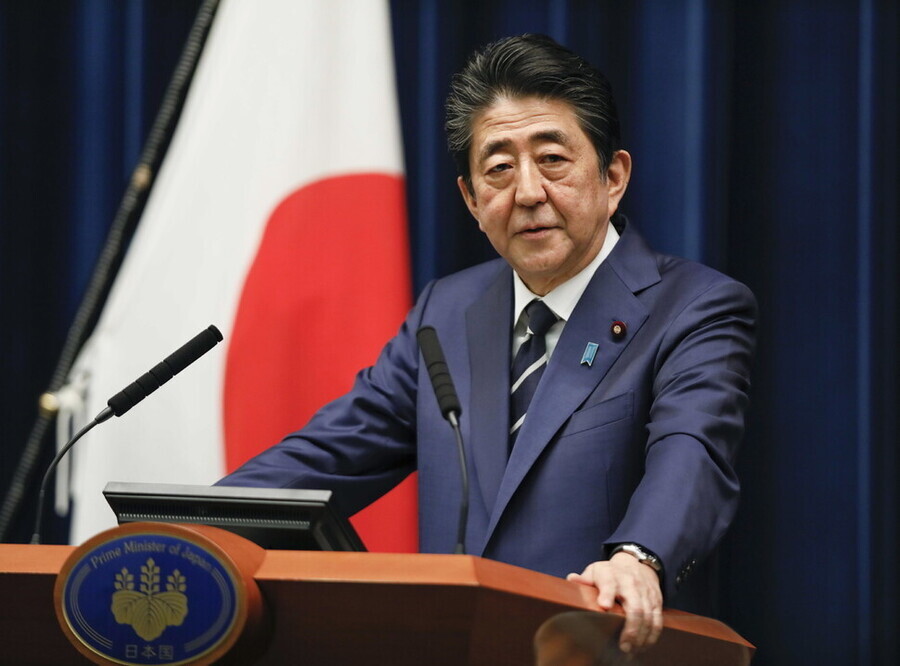hankyoreh
Links to other country sites 다른 나라 사이트 링크
Japan opposes S. Korea’s participation in US expanded G7 summit

Japan has expressed opposition to the US’ idea of including South Korea in an expanded G7 summit on the grounds that its “views on North Korea and China differ from those of the existing G7,” a Japanese news outlet reported.
In a June 28 report citing multiple US and Japan diplomatic sources, the Kyodo News agency said that shortly after US President Donald Trump proposed the addition of South Korea, Australia, India, and Russia to the G7 in late May, a senior Japanese government official communicated to the US that South Korea’s “diplomatic position on China and North Korea differs from the G7” and that Tokyo “opposes South Korea’s participation” on that basis.
The US reportedly responded in general terms, explaining that Trump would be “making the final decision.” The agency explained that the response “seemed to reflect the aims of Japanese Prime Minister Shinzo Abe, who is attempting to maintain Japan’s diplomatic advantage as the only G7 member from Asia.” It also predicted a “possibility of further cooling of relations between South Korea and Japan, which have been at odds over historical and other matters.” Chief Cabinet Secretary Yoshihide Suga was tight-lipped in a regular press conference on June 1, offering only that there was a “close exchange of opinions between Japan and the US, although I cannot reveal the details.”
In contrast, Blue House Spokesperson Kang Min-seok announced the same day that Trump had “invited South Korea” in connection with the expansion of the G7 to a G11 or G12 framework and that President Moon Jae-in had responded that he would “gladly accept.”
Japan’s attempt to block South Korea’s participation in an expanded G7 on the basis of the Moon administration’s views toward North Korea and China reads as a key change in position, signaling that it intends to approach South Korea as a “potential rival” with different world views rather than an “invaluable neighbor” sharing strategic interests as before. Indeed, after inter-Korean dialogue and North Korea-US negotiations were initiated in January 2018 to resolve the North Korean nuclear issue, Japan effectively hindered progress with dialogue through its constant wariness about the Korean Peninsula peace process.
A Blue House senior official sounded a cautious note in a telephone interview with the Hankyoreh, saying that “we may make a determination regarding the background or veracity once Japan’s official position is stated.”
By Gil Yun-hyung, Choi Hyun-june, and Seo Young-ji, staff reporter
Please direct comments or questions to [english@hani.co.kr]

Editorial・opinion
![[Guest essay] Preventing Korean Peninsula from becoming front line of new cold war [Guest essay] Preventing Korean Peninsula from becoming front line of new cold war](https://flexible.img.hani.co.kr/flexible/normal/500/300/imgdb/original/2024/0507/7217150679227807.jpg) [Guest essay] Preventing Korean Peninsula from becoming front line of new cold war
[Guest essay] Preventing Korean Peninsula from becoming front line of new cold war![[Column] The state is back — but is it in business? [Column] The state is back — but is it in business?](https://flexible.img.hani.co.kr/flexible/normal/500/300/imgdb/original/2024/0506/8217149564092725.jpg) [Column] The state is back — but is it in business?
[Column] The state is back — but is it in business?- [Column] Life on our Trisolaris
- [Editorial] Penalties for airing allegations against Korea’s first lady endanger free press
- [Editorial] Yoon must halt procurement of SM-3 interceptor missiles
- [Guest essay] Maybe Korea’s rapid population decline is an opportunity, not a crisis
- [Column] Can Yoon steer diplomacy with Russia, China back on track?
- [Column] Season 2 of special prosecutor probe may be coming to Korea soon
- [Column] Park Geun-hye déjà vu in Yoon Suk-yeol
- [Editorial] New weight of N. Korea’s nuclear threats makes dialogue all the more urgent
Most viewed articles
- 1[Guest essay] Preventing Korean Peninsula from becoming front line of new cold war
- 260% of young Koreans see no need to have kids after marriage
- 3Yoon’s broken-compass diplomacy is steering Korea into serving US, Japanese interests
- 4After 2 years in office, Yoon’s promises of fairness, common sense ring hollow
- 5[Column] Why Korea’s hard right is fated to lose
- 6S. Korean first lady likely to face questioning by prosecutors over Dior handbag scandal
- 7[News analysis] Jo Song-gil’s defection and its potential impact on inter-Korean relations
- 8[Column] “Hoesik” as ritual of hierarchical obedience
- 9Amid US-China clash, Korea must remember its failures in the 19th century, advises scholar
- 1011 years after US decamped, military base in Busan still festering with pollution